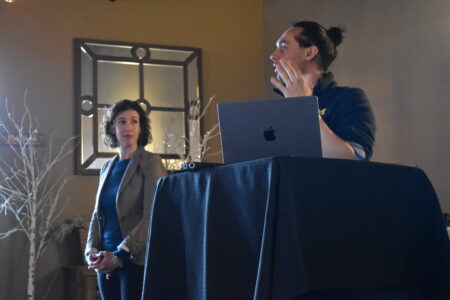The cashew lady: Finding meaning in what opportunies life sends you
Many years ago I was a music student at Grand Rapids Junior College. Our Music Theory class was invited to attend a lecture at Hope College in Holland, Michigan. The world renowned composer/conductor, Leonard Bernstein, had been invited to present a lecture to the music students of Hope College.
A limited number of extra seats were made available to area music students. I eagerly purchased a ticket and looked forward to the opportunity to hear this musical giant.
During the lecture, Bernstein spoke about composing some of his, what are now considered, master works, such as “West Side Story,” “Candide” and his “Mass.” I was awed by his talent and overwhelmed by his humility.
He was a genuinely humorous man, and he had that wonderful quality of not taking himself too seriously.
I don’t remember too many specifics from the lecture, but one story that he told has always stuck with me. He had been invited to an (like he said with eyebrows raised) “upper class cocktail party” on New York’s famous Fifth Avenue. The guests were some of the giants of industry and finance. Again, with eyebrows raised, he said “a few of us from the arts and entertainment field had also been invited,”
As he moved around the room he was sometimes asked, “And who might you be, and what do you do?” Bernstein would answer that he was a composer. Like he said, it usually ended the interest in him”, and the group’s conversation would return to finance and industry.
However, he said, “In one group a person actually asked him, “And what does a composer do?” Leonard replied, “Oh, I put little black dots on white paper for other people to read.”
The questioner looked puzzled, and then in a somewhat condescending tone said, “Oh that’s nice. How interesting,” and with that the conversation returned to finance and industry.
I have never forgotten that story.
As a musician, when playing another person’s “black dots on white paper” it is my privilege to interpret those “little black dots” and to either try to bring out the composer’s intent or perhaps find new meanings in those same “little black dots.”
This prologue explains what I was doing seated at the organ in the St. Stephen’s sanctuary on the day in question. It was one of those magical moments. I had been hard at work delving into the “Adagietto” from “Gustav Mahler’s 5th Symphony.” It is perhaps Mahler’s most famous orchestral composition.
On the surface it seems so simple, but as I began to discover, it was a hidden treasure of emotion. Now it was up to me to use the unlimited, beautiful tonal resources of our Johannus organ to bring those tonal and emotional qualities to life.
Time seemed frozen, like the outdoor landscape. The bright sunlight sent its distant rays through the beautiful, stained glass sanctuary windows. I sat transfixed, surrounded by a glow that seemed like a vision from another place, another time.
The music ebbed and flowed; and slowly, like a Rembrandt painting, the musical canvas came to life and I was filled with a serenity that was beyond time or space. I became aware of someone standing next to the organ. I recognized her immediately. It was Dorothy, one of the St. Stephen’s Nursery Caregivers.
I got off the bench and gave her a hug. She handed me a gift. It was the identical gift that she had brought to me last year, and the year before that. It was a bag of cashews.
“How are you” I asked.
She replied, “Not really well.”
We sat down in a nearby pew, and she told me about health issues and other complications that challenged her each day. We talked for a little while, and I did my best to speak words of encouragement.
I thanked her again for her gift, hugged her again, and then she went on her way.
I slowly returned to the organ bench and sat quietly for a long time, reflecting on what had just transpired. I thought about the New Testament story about the poor widow who had brought an offering to the temple. She had shared of what little she had to help enrich the lives of others.
Dorothy was that widow. She too had brought her gift to share with me of the little she had, and in so doing, I had seen the face of God.
I went back to the “Adagietto” with a new understanding. Those little black dots suddenly had a whole new meaning. Scholars have written countless volumes trying to explain something that is perhaps as simple as a bag of cashews.
EDITOR’S NOTE: Gerrit Lamain is a former Copper Country resident who served as a music professor at Suomi College. He was also the organist for the Michigan Tech hockey team before moving on to the Minnesota North Stars.




